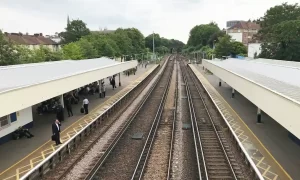A “spring of discontent” is looming for the railways as unions and senior rail officials prepare for widespread industrial action in response to curbs in government emergency funding that spell job cuts, pay freezes and closures.
Talks between the industry and unions to negotiate the £1.5bn-£2bn savings demanded by the Treasury were held through last year on the basis of no compulsory redundancies and no walkouts. That agreement lapsed at the end of 2021 – leaving unions warning of immediate strike action should any jobs be axed.
That outcome now appears inevitable, with formal proposals for cuts, including substantial job losses in maintenance roles to save £100m annually at Network Rail, expected in the coming weeks. Train operators will try to cut staff costs in a move to contactless ticketing. Mick Lynch, the leader of rail’s biggest union, the RMT, says: “It’s our belief that they want to close virtually every ticket office on the mainline railway.”
The roots of the dispute lie with the coronavirus pandemic, which has upended the finances of rail firms – potentially even more than those of the London Underground, where two 24-hour strikes earlier this month closed the tube. Passenger numbers have fluctuated similarly on both networks, from deserted at the start of the pandemic to between 60 and 70% of pre-Covid levels now.
Yet the past two years have brought other changes that mean some are questioning how much power a stoppage still holds to disrupt on national rail and London transport.
Tim Shoveller, a Network Rail regional director, said: “Even as passenger numbers start to recover, we know travel habits and passenger demand have changed and the industry has to change, too. We cannot keep relying on government handouts. We are discussing ideas with our unions about how we can modernise to create better and safer jobs for our people.”
Unions argue that their members, who kept transport services running during the pandemic, should not pick up the tab, either on national rail or in the capital. More RMT walkouts are likely in London, where pensions as well as job cuts are in the frame, after the mayor, Sadiq Khan, was told to find £500m in annual cost savings in order to receive almost £5bn in emergency state funding to cover shrinking tube fare income.
But do rail strikes still work for unions? Bringing London to a standstill for most of the working week would have been intolerable to many businesses before Covid; with Tube trains normally now only two-thirds full, the impact this month was muted. Many commuters could dodge the disruption by staying at home to work, leaving the city’s remaining trains, buses and roads crowded but far more functional than in strike days gone by.
A similar picture could emerge on national rail this spring: some key commuter railways, such as South Western, which once heaved with annual season ticket holders riding daily to the City, have been left with their lucrative regular clientele melting away. A senior industry source says of the strike option: “They used to have an ace of spades. Now it’s a five of hearts.”
Others disagree. Mick Whelan, the general secretary of Aslef, the train drivers’ union, contends that the threat of a strike could be “more powerful in the confusing new world created by Grant Shapps”. Under the transport secretary’s reforms to franchising, more of the railway is under central control through new contracts where all fare income goes to government rather than being at the operators’ risk.
The London School of Economics professor Tony Travers, a local government expert, argues that despite the falling numbers of affected commuters who may be stranded by a rail strike, “the government, in a curious way by guaranteeing the income, has re-empowered the unions. They can use their muscle in the normal way because the government and Khan still want to keep the tube and the national railway running.”
While smaller than the RMT, the drivers’ union has a greater ability to stop trains: in the Southern dispute of 2016-17, rail managers attempted to step in to replace striking RMT conductors but nothing ran on the few days that Aslef went on strike.
At the moment, it is relatively relaxed about its members’ prospects: train companies remain short of drivers and rely on overtime – and about 2,000 drivers, who are typically middle-aged men, are due to retire in the next five years. However, Whelan says: “There are issues that would, rightly, lead to national action. Let’s remember that many of our members, who put themselves at risk for two years during the pandemic, have received no pay rises. That cannot continue.”
The final year of an inflation-linked pay deal has kept tube salaries up in London but on national rail, Lynch says a two-year freeze is “effectively a 10% cut so far and the clock is ticking”. A total of 1,450 managers have also left Network Rail, so far by voluntary redundancy, saving £100m. The TSSA union said any compulsory cuts would prompt immediate industrial action.
The Rail Delivery Group estimates that £14bn in fare revenue has been lost to the industry since the pandemic started, with another £6bn shortfall over the next three years. A spokesperson said it had been “an unprecedented financial shock”, adding: “The whole industry needs to respond to the challenges we face with the acceleration of changing travel patterns and more passengers migrating to digital technology.”
Ticket offices are under threat of closure – a politically difficult prospect, not only because of union opposition. “People see there’s no argument when you do the sums,” said a senior figure at a rail operating group. “But they don’t want their own one closed.”
For the RMT at least, there is no sign of strikes abating. The union has been coordinating action ranging from the night tube dispute, which has stopped Transport for London relaunching 24-hour weekend services, to walkouts by conductors on TransPennine Express, and outsourced train cleaners at Churchill in the south-east.
“We don’t like going on strike. Our members lose money, we take a lot of heat and it’s not a great position,” Lynch says. However, he adds: “The reason people see us is because our union will not be cowed. The unions that have given way have lost membership and lost the ability to fight for people.”
For Lynch, the point of this month’s walkouts was clear: “Where unions don’t fight, people end up on the minimum wage, no pension, no rights. I think it will make a difference because it shows people that we’re serious.”
Read more:
‘Spring of discontent’ as wave of strikes loom for Covid-hit railways
















